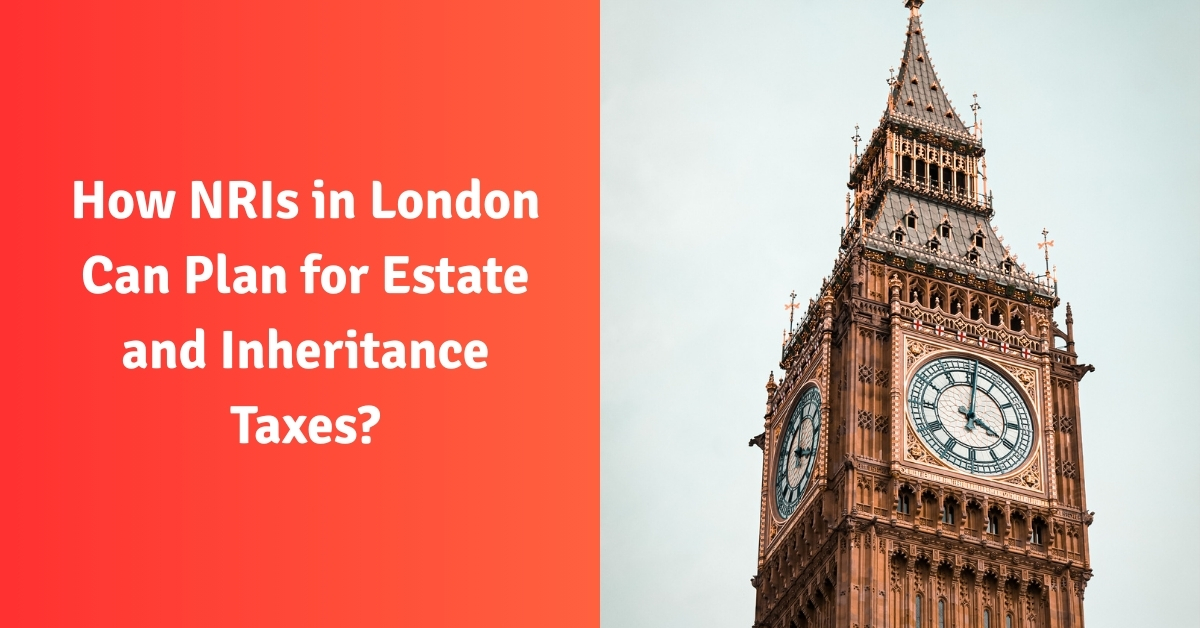How NRIs in London Can Plan for Estate and Inheritance Taxes?

For Non-Resident Indians residing in London, estate and inheritance planning extends beyond asset distribution it involves protecting wealth across borders, minimizing tax burdens, and ensuring smooth legacy transfer to intended beneficiaries. The UK maintains one of the world’s most structured inheritance tax systems, and inadequate planning can leave heirs facing substantial financial burdens.
This comprehensive guide assists NRIs in London navigate estate planning, inheritance taxes, and cross-border regulations confidently, combining UK and Indian legal insights for optimal outcomes.
Understanding UK Inheritance Tax
Unlike India, which currently lacks inheritance tax, the UK levies inheritance tax (IHT) on estates exceeding specific thresholds. As of 2025, the basic IHT threshold remains £325,000, with amounts above this taxed at 40%.
The critical consideration this tax applies not only to UK citizens but also NRIs who are “domiciled” or “deemed domiciled” in the UK. Long-term London residents, those married to UK citizens, or individuals residing 15 of the last 20 years may fall into this category despite holding Indian nationality.
This reality makes strategic tax planning absolutely essential for wealth preservation.
NRI Estate Planning: Dual Jurisdiction Perspective
Estate planning transcends taxation it ensures legal compliance with your wishes across both jurisdictions. NRI estates in London often span multiple geographies UK real estate, Indian properties, offshore investments, or assets in financial centers like GIFT City.
Three key areas require attention:
1. Creating Jurisdiction-Specific Wills: Ideally, maintain separate wills for UK and Indian assets, preventing delays, jurisdictional conflicts, and probate complications.
2. Avoiding Dual Taxation: While India and the UK lack estate tax treaties, you can still leverage Double Taxation Avoidance Agreement (DTAA) provisions to avoid double taxation on income streams, particularly capital gains or dividends.
3. Trusts and Gifting Strategies: Establishing trusts helps segregate assets and reduce IHT liability. Lifetime gifting represents another option, but must be executed wisely to fall outside the UK’s 7-year gifting rule affecting tax applicability.
Common NRI Estate Planning Mistakes
Estate planning often receives inadequate attention during youth, peak earnings, and comfortable settlement abroad. However, these mistakes could prove costly for families:
- Failing to update nominees on Indian accounts, insurance policies, or mutual fund investments
- Assuming UK tax laws don’t apply to Indian assets
- Neglecting to repatriate or regularize Indian assets, creating complex legal procedures
- Using UK-only wills for assets spanning India, Dubai, and Singapore
Understanding that NRI estate planning requires comprehensive cross-border coordination rather than single-document solutions is crucial for effective wealth transfer.
Professional Advisory Benefits
Certified financial advisors with NRI expertise streamline entire estate planning processes. They provide:
- Guidance on domicile and residency rule implications
- UK and India will coordination with legal experts
- Customized investment and tax-minimization strategies
- Repatriation guidance for inherited Indian assets
- Family trust establishment or strategic gifting plans
Appropriate advisors don’t merely help with planning they ensure compliance while providing invaluable peace of mind for complex cross-border scenarios.
Conclusion
Estate planning while living abroad might seem like future concerns, but it represents one of today’s smartest financial decisions. For NRIs in London, understanding how UK inheritance tax laws impact global assets forms the foundation for building resilient family legacies.
Ensure your wealth receives protection not just accumulation through comprehensive planning that addresses the unique challenges and opportunities of cross-border financial management.
FAQs
1. Does inheritance tax apply to London-based NRIs?
Ans- Yes, if you’re domiciled or deemed domiciled in the UK, worldwide assets may face taxation.
2. What is the current UK inheritance tax threshold?
Ans- £325,000. Estates above this amount face 40% taxation.
3. Are two wills necessary for assets in India and the UK?
Ans- Yes, it’s highly recommended to prevent legal complications during probate proceedings.
4. Are Indian assets subject to UK taxation after death?
Ans- They can be, depending on domicile status. Proper planning remains essential.
5. Can Indian inheritance be repatriated to the UK?
Ans- Yes, but requires legal documentation and RBI/FEMA compliance.
6. How can inheritance tax liability be reduced?
Ans- Through trusts, lifetime gifting, spousal exemptions, and comprehensive estate planning strategies.
7. Does India impose inheritance tax?
Ans- No, India currently maintains no inheritance or estate tax.
8. What is a trust, and how does it help?
Ans- Trusts enable efficient asset distribution while minimizing tax liabilities through proper structuring.
9. Will Indian mutual funds face UK taxation upon death?
Ans- Yes, they may be included in estate valuations for IHT purposes.
10. Can UK wills cover Indian properties?
Ans- Separate wills for each jurisdiction provide clarity and jurisdictional ease.
Disclaimer: The information provided here is for educational and informational purposes only and should not be construed as financial, legal, or tax advice. Consult with a qualified professional before making any investment decisions. We do not accept any liability for errors or omissions in this information nor any direct, indirect, or consequential losses arising from its use.



